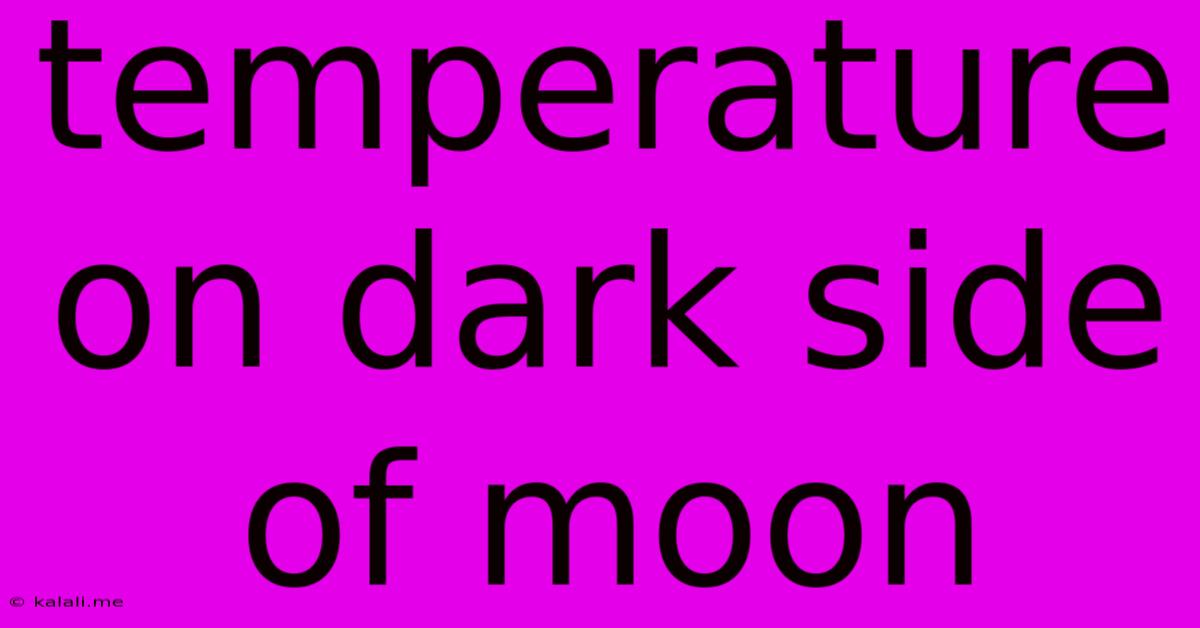Temperature On Dark Side Of Moon
Kalali
May 30, 2025 · 3 min read

Table of Contents
The Temperature on the Dark Side of the Moon: A Deep Freeze
The Moon's captivating allure has fueled human curiosity for millennia. One enduring mystery, often misconstrued, surrounds the temperature of the Moon's "dark side." This article will clarify the misconception and delve into the actual temperature variations experienced across the lunar surface, including the areas that never face the Sun. Understanding this requires grasping the key factors affecting lunar temperature: solar radiation, lunar rotation, and the lack of atmosphere.
The term "dark side" is a misnomer. Both sides of the Moon experience periods of daylight and darkness. The more accurate term is the "far side" – the hemisphere perpetually turned away from Earth. It's crucial to differentiate between the far side and the idea of a permanently shadowed side, which exists in both hemispheres and in permanently shadowed craters at the lunar poles. These permanently shadowed regions are of great interest because they may contain water ice.
Factors Affecting Lunar Temperature
-
Solar Radiation: The primary driver of lunar temperature is, unsurprisingly, the Sun. Direct sunlight causes significant heating, while the absence of sunlight leads to extreme cooling.
-
Lunar Rotation: The Moon's slow rotation (approximately 27.3 Earth days) results in long periods of both sunlight and darkness. This extended exposure intensifies both heating and cooling cycles.
-
Lack of Atmosphere: Unlike Earth, the Moon lacks a substantial atmosphere to moderate temperature fluctuations. This absence prevents the trapping of heat (greenhouse effect) and allows for extreme temperature swings.
Temperature Extremes on the Lunar Surface
During lunar day, temperatures on the sunlit surface can soar to 127°C (260°F). Conversely, during the lunar night, temperatures plummet to a frigid -173°C (-280°F). These extreme variations occur primarily because of the lack of atmospheric insulation and the long periods of sunlight and darkness. The temperature differences between the lunar equator and the poles are also significant, with the polar regions generally experiencing lower average temperatures.
Temperatures on the Far Side vs. Near Side
While the far side experiences similar temperature extremes to the near side, slight variations exist due to subtle differences in surface composition and topography. These variations are minor compared to the dramatic temperature swings between day and night. Neither side is inherently colder or hotter than the other; the differences are largely insignificant in the context of the overall extreme temperature range.
Permanently Shadowed Regions: A Different Story
The permanently shadowed craters at the lunar poles represent a unique environment, characterized by extremely low temperatures that remain consistently close to -240°C (-400°F). These frigid conditions are crucial for the potential preservation of water ice, a vital resource for future lunar exploration and potential colonization efforts. This is significantly colder than the average temperature experienced on the sunlit or dark sides of the Moon.
Conclusion: Dispelling the Myth
The "dark side" of the Moon isn't inherently colder than the near side. Both hemispheres experience equally extreme temperature swings driven by solar radiation, the Moon's slow rotation, and the absence of a substantial atmosphere. The truly cold places on the Moon are the permanently shadowed regions near the poles, holding the potential for valuable resources like water ice. Understanding these temperature variations is crucial for planning future lunar missions and unraveling the mysteries of our celestial neighbor.
Latest Posts
Latest Posts
-
Vim Delete From Cursor To End Of Line
Jun 01, 2025
-
Smoke Alarm Went Off Then Stopped
Jun 01, 2025
-
Ground Prong Broke Off In Outlet
Jun 01, 2025
-
How To Cut An Object In Half In Blender
Jun 01, 2025
-
How Long Is Validead Good For
Jun 01, 2025
Related Post
Thank you for visiting our website which covers about Temperature On Dark Side Of Moon . We hope the information provided has been useful to you. Feel free to contact us if you have any questions or need further assistance. See you next time and don't miss to bookmark.